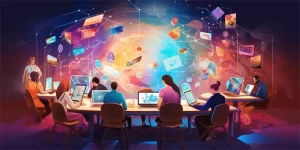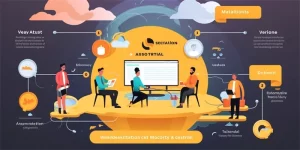Artificial Intelligence (AI) has become a game-changer in various industries, and education is no exception. With its ability to process massive amounts of data and provide personalized solutions, AI is revolutionizing the way students learn, making education more accessible, engaging, and efficient. In this article, we will explore the significant ways AI empowers learners with personalized and immersive experiences.

1. Personalized Learning Paths
One of the most significant advantages of AI in education is the ability to tailor learning paths to individual students’ needs. By analyzing data on students’ strengths, weaknesses, and learning styles, AI can create personalized curricula that cater to their specific needs. This ensures that students receive targeted instruction, enabling them to progress at their own pace while addressing their knowledge gaps effectively.
Furthermore, AI-powered adaptive learning platforms, such as Khan Academy and Duolingo, can continuously assess students’ performance and adjust the difficulty of content accordingly. This dynamic learning experience optimizes engagement and ensures learners are always challenged without feeling overwhelmed.
2. Intelligent Tutoring Systems
Traditional tutoring can be costly and limited by the availability of qualified tutors. AI-powered intelligent tutoring systems, on the other hand, provide personalized guidance and support to students at any time. These systems analyze learning patterns and provide immediate feedback, helping students understand concepts more effectively.
For example, Carnegie Learning’s AI-driven math tutoring system utilizes natural language processing and machine learning algorithms to understand students’ written responses and provide real-time feedback. This personalized assistance fosters independent problem-solving skills and enhances overall learning outcomes.
3. Virtual Reality (VR) and Augmented Reality (AR) Experiences
AI, combined with VR and AR technologies, offers immersive learning experiences that transcend traditional classroom settings. These technologies provide students with lifelike simulations and interactive environments, enabling them to explore concepts and scenarios in a practical and engaging way.
For instance, zSpace is a virtual reality platform that allows students to dissect virtual organisms or perform complex scientific experiments without the need for physical specimens or expensive laboratory equipment. This hands-on approach enhances comprehension and retention, making learning more memorable and enjoyable.
4. Intelligent Content Creation and Curation
AI algorithms can analyze vast amounts of educational content, such as textbooks, articles, and multimedia, to identify and curate the most relevant and up-to-date materials for learners. This ensures that students have access to high-quality resources that are tailored to their specific learning objectives.
Addtionally, AI-powered content creation tools, such as OpenAI’s GPT-3, can generate educational materials, including quizzes, lessons, and summaries. This technology saves teachers time and effort, enabling them to focus on providing personalized guidance and support to students.
5. Intelligent Grading and Assessment
Traditionally, grading and assessment have been time-consuming tasks for educators. However, AI has the potential to automate this process, providing faster and more accurate feedback to students. AI-powered grading systems can analyze essays, exams, and assignments, evaluating them based on predefined rubrics.
Moreover, AI-powered assessment tools, like Mettl and ProctorU, can monitor students during exams to ensure academic integrity. These tools use facial recognition and eye-tracking technologies to detect any suspicious behavior, minimizing the risk of cheating and maintaining a fair evaluation process.
6. Individualized Feedback and Support
AI chatbots and virtual assistants, like IBM’s Watson Assistant, can provide students with instant and individualized support. These systems utilize natural language processing to understand students’ questions and provide accurate responses, just like a human tutor would.
Additionally, AI can analyze students’ behavior patterns and emotional states to identify signs of stress or frustration. By detecting these indicators, AI systems can offer timely intervention and support, ensuring students receive the assistance they need to overcome challenges and thrive in their learning journey.
7. Enhanced Accessibility and Inclusivity
AI-powered technologies offer numerous benefits in terms of accessibility and inclusivity. For students with disabilities, AI can provide personalized accommodations, such as text-to-speech or speech-to-text capabilities, ensuring they can access educational content and participate fully in learning activities.
Furthermore, AI-powered translation tools, such as Google Translate and Microsoft Translator, break down language barriers, enabling students from diverse linguistic backgrounds to access educational materials in their native languages. This promotes inclusivity and equal opportunities for all learners.
8. Intelligent Data Analytics
AI algorithms can analyze vast amounts of data generated by students, such as performance metrics, attendance records, and engagement levels. This data-driven approach provides valuable insights for educators, enabling them to identify struggling students, tailor interventions, and refine instructional strategies.
Additionally, AI analytics can identify patterns and trends in learning outcomes, helping institutions make data-informed decisions to improve curriculum design, resource allocation, and overall educational effectiveness. This evidence-based approach enhances the quality of education and ensures students receive the best possible learning experience.
Frequently Asked Questions:
Q: Will AI replace teachers in the future?
A: While AI can enhance and automate certain aspects of education, such as grading and content curation, it is unlikely to replace teachers entirely. Human teachers provide essential social and emotional support, mentorship, and facilitation of critical thinking skills, which AI cannot replicate.
Q: What are the privacy concerns related to AI in education?
A: Privacy concerns regarding AI in education include the collection and storage of sensitive student data, potential misuse of personal information, and the need for robust cybersecurity measures. It is crucial for educational institutions to prioritize data protection and ensure compliance with privacy regulations.
Q: How can AI promote creativity and critical thinking?
A: AI can promote creativity and critical thinking by automating repetitive tasks, such as grading and content creation, freeing up teachers’ time to focus on facilitating higher-order thinking skills. Additionally, AI-powered tools can provide personalized feedback and support, encouraging students to think critically and explore innovative solutions.
References:
1. Grover, S., & Kumar, R. (2018). Artificial intelligence for education: Challenges and opportunities. Journal of Educational Technology and Society, 21(3), 222-233.
2. Balakrishnan, G., & Cohen, W. W. (2019). 5 Ways AI-Powered Education Is Changing How We Learn. Harvard Business Review. Retrieved from https://hbr.org/2019/10/5-ways-ai-powered-education-is-changing-how-we-learn








